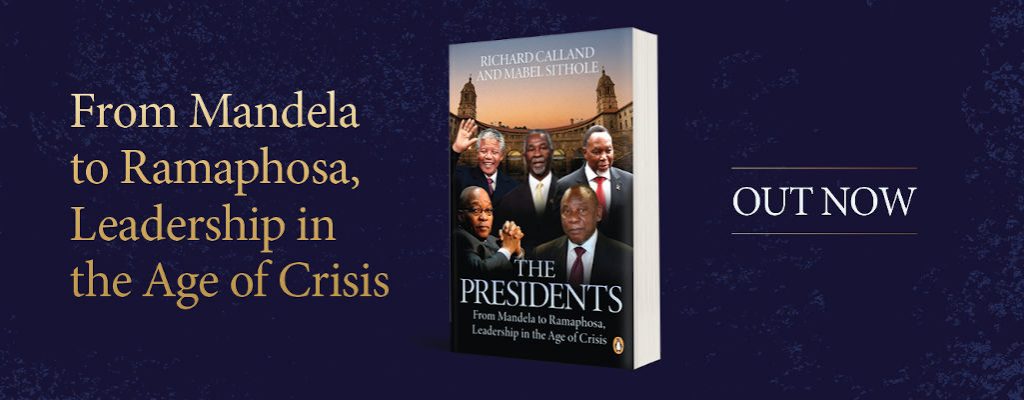‘The globe is littered with dismal populists, nationalists or downright dictators.’
More about the book!

With the ANC’s national elective conference coming up, political analyst and co-author of The Presidents Richard Calland reflects on ‘the age of crisis’ in which SA sits with its political leaders.
The Presidents: From Mandela to Ramaphosa, Leadership in the Age of Crisis is out now from Penguin Random House.
‘Political leadership desperately needs strategic courage.’
Everywhere you look, political leaders are floundering. Their fecklessness and foolishness drives me mad with frustration and anger. I know many people share my dismay and are turning their backs on liberal democracy as a result.
As Amina Mohammed, the UN deputy secretary-general, told a packed Cape Town City Hall in October this year at the annual Archbishop Desmond Tutu lecture, humanity faces a ‘multitude of cascading and compounding crises’ – from the climate crisis, to increasing levels of poverty and inequality following the Covid-19 pandemic, to geo-political insecurity arising from the Russian invasion of Ukraine and the knock-on effect on global energy prices and the cost of food, and the rising tide of Xenophobia and fascism.
To my mind, political leaders are a big part of the problem. The globe is littered with populists, nationalists or downright dictators. The problems the world faces are complex – these are ‘wicked problem’ systemic failures and pressures. They require careful solutions, that must inevitably be both multi-sectoral and multi-stakeholder, but also transnational.
They require international co-operation of an unprecedented level. But, many of these leaders are eager to withdraw behind their national frontiers, sowing fear in their wake, and, as former Guardian editor Alan Rusbridger neatly defines ‘populism’, ‘denying complexity’ as they offer snake oil salesman prescriptions to their increasingly desperate electorates. This, then, is the age of crisis – part of the subtitle of my and Mabel Sithole’s new book, The Presidents, which examines the performance of South Africa’s five presidents of the post-1994 democratic era.
What lessons can we learn from these remarkable political leaders? Remarkable, that is, because they all come from the same political party – the African National Congress, which so far has been dominant electorally, but has rotated power within its ranks and enabled SA to avoid the post-colonial/post-independence ‘big man’ trap of many African countries.
A reform-minded Cyril Ramaphosa, who ousted Jacob Zuma in early 2018, embarked on a programme of rebuilding and renewal. How has he done? The Presidents addresses this question head-on, as well as evaluating the extent to which the other four presidents confronted the underlying causes of the various crises that they faced when in office.
A colleague wryly asked me ‘is the chapter on Cyril titled “Great Expectations”’? Certainly, there were great expectations. Remember ‘Ramaphoria’? That bubble has burst – load shedding has undermined confidence in his government’s ability to get things done, Covid-19 stalled any economic recovery, and now #PhalaPhala has dented Ramaphosa’s credibility as a corruption-buster.
Context in politics always matters if one is interested in a fair and reasonable analysis. Given the strong headwinds, and the state of his own party, which is a drag factor, perhaps Ramaphosa’s was a mission impossible. But his lack of strategic courage has weakened his presidency at a time when SA, like the world, was crying out for great, transformational leadership from the top.
~~~
This article was originally published in The Penguin Post, a magazine from Penguin Random House South Africa.
Categories Non-fiction South Africa
Tags Mabel Sithole Penguin Random House SA Richard Calland The Penguin Post The Presidents
